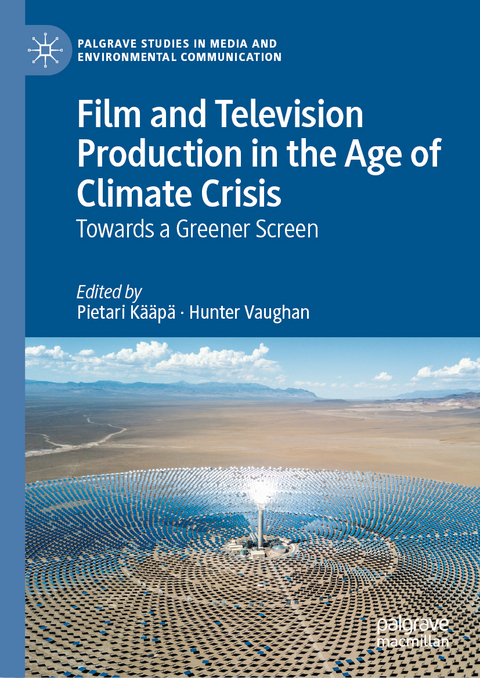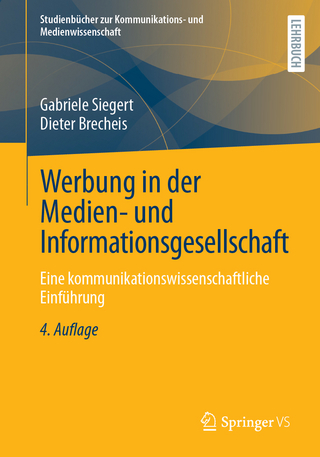
Film and Television Production in the Age of Climate Crisis
Springer International Publishing (Verlag)
978-3-030-98119-8 (ISBN)
Due to its immense sociocultural influence and economic resources, the global screen media industry is at the forefront of raising awareness for the political and social issues resulting from accelerated environmental instability. However, the 21st century relationship between screen media and the environment has another face that demands urgent scrutiny. The advent of the digital age and the vast electrical and Information and Communication Technologies (ICT) infrastructures required to support digital production, distribution, and archiving has resulted in the rapid expansion and diversification of the industry's resource use, infrastructure construction, energy dependency, and consequent waste and emissions production. Addressing these structures is essential to alleviating their environmental and social impact and ensuring that the industry's rhetoric on environmental responsibility is reflected in its practice.
As a mitigating counterbalance to the above trends, there has been a heightenedpush for sustainability measures along various lines of industry management, policy, and practice. These initiatives-including the cultural values they reflect, the political economies that form their logic, the managerial and marketing tactics that orchestrate them, and the environmental realities of their implementation-form the central object of inquiry for this collection.
Hunter Vaughan is the Environmental Media Scholar-in-Residence at the University of Colorado Boulder.
Pietari Kääpä is associate professor in media and communications at University of Warwick.
Contributor biographies
Mette Hjort is Chair Professor of Humanities and Dean of Arts at Hong Kong Baptist University, Visiting Professor of Creative Industries at the University of South Wales, and Affiliate Professor of Scandinavian Studies at the University of Washington, Seattle.
Cathy Greenhalgh is a director / cinematographer, lecturer, media anthropologist and writer and has thirty years university teaching and management expertise.
Josefine Madsen is founder of the Danish eco media consultancy Jordnær Creative.
Anne Ahn Lund is co-founder of the Danish eco media consultancy Jordnær Creative.
Pat Brereton is Professor of Media and Communications at Dublin City University
Birgit Heidsiek is the CEO of Green Film Shooting, a sustainability consultancy based in Hamburg Germany
Earth Angel: Emellie O'Brien is a pioneer of the sustainable filmmaking movement, working with major motion pictures and television series to reduce their environmental impact as well as their bottom line since 2011. Daphne Medina is Director of Business Development. Pamela Rice is Materials Coordinator. Jackson Xia is Eco Coordinator.
Zena Harris is the President of the Green Spark Group, a full service sustainability consultancy for the entertainment industry.
Andrew McWhirter is Senior Lecturer and Programme Leader of BA/BA (Hons) Media and Communication at Glasgow Caledonian University.
Laura U. Marks works on media art and philosophy with an intercultural focus.Marks is Grant Strate Professor in the School for the Contemporary Arts at Simon Fraser University in Vancouver.
Introduction_ Chapter 1.- Film and Television Production in the Era of Accelerated Climate Change: A Greener Screen?_ Section 1: Policy and governance_ Chapter 2.- Environmental media governance: strategies for encountering uncertainty and innovation in the screen media industries_ Chapter 3.- Policy Approaches to Green Film Practices: Local Solutions for a Planetary Problem_ Chapter 4.- European Screen Agencies and Sustainability: Interventions for Greening the Screen_ Section 2: Transnational green production_ Chapter 5.- The Necessity of Sustainable Filmmaking: Production Notes from Palestine, Burkina Faso, and Zanzibar_ Chapter 6.- The joys and pain of growth: outlook for the film industry and the audio-visual sector in Colombia_ Chapter 7.- Greening the Media Industry: a case study of Ireland_ Section 3: The futures of green media_ Chapter 8.- Passing on Responsibility: Obstacles to Green Film Production in the Netherlands_ Chapter 9.- Andrew McWirther: A scholarship of hope: taking stock of UK screen industries via the lens of digital work over digital solutionism_ Chapter 10.- Laura U. Marks and Radek Przedpelski: The Carbon Footprint of Streaming Media: Problems, Calculations, Solutions.
| Erscheinungsdatum | 20.08.2022 |
|---|---|
| Reihe/Serie | Palgrave Studies in Media and Environmental Communication |
| Zusatzinfo | XV, 242 p. 2 illus. |
| Verlagsort | Cham |
| Sprache | englisch |
| Maße | 148 x 210 mm |
| Gewicht | 464 g |
| Themenwelt | Sozialwissenschaften ► Kommunikation / Medien ► Kommunikationswissenschaft |
| Sozialwissenschaften ► Kommunikation / Medien ► Medienwissenschaft | |
| Schlagworte | Ecocinema • Ecocriticism • Greening • media production • screen industries • SDG • sustainability • Sustainable Development Goals |
| ISBN-10 | 3-030-98119-3 / 3030981193 |
| ISBN-13 | 978-3-030-98119-8 / 9783030981198 |
| Zustand | Neuware |
| Informationen gemäß Produktsicherheitsverordnung (GPSR) | |
| Haben Sie eine Frage zum Produkt? |
aus dem Bereich


